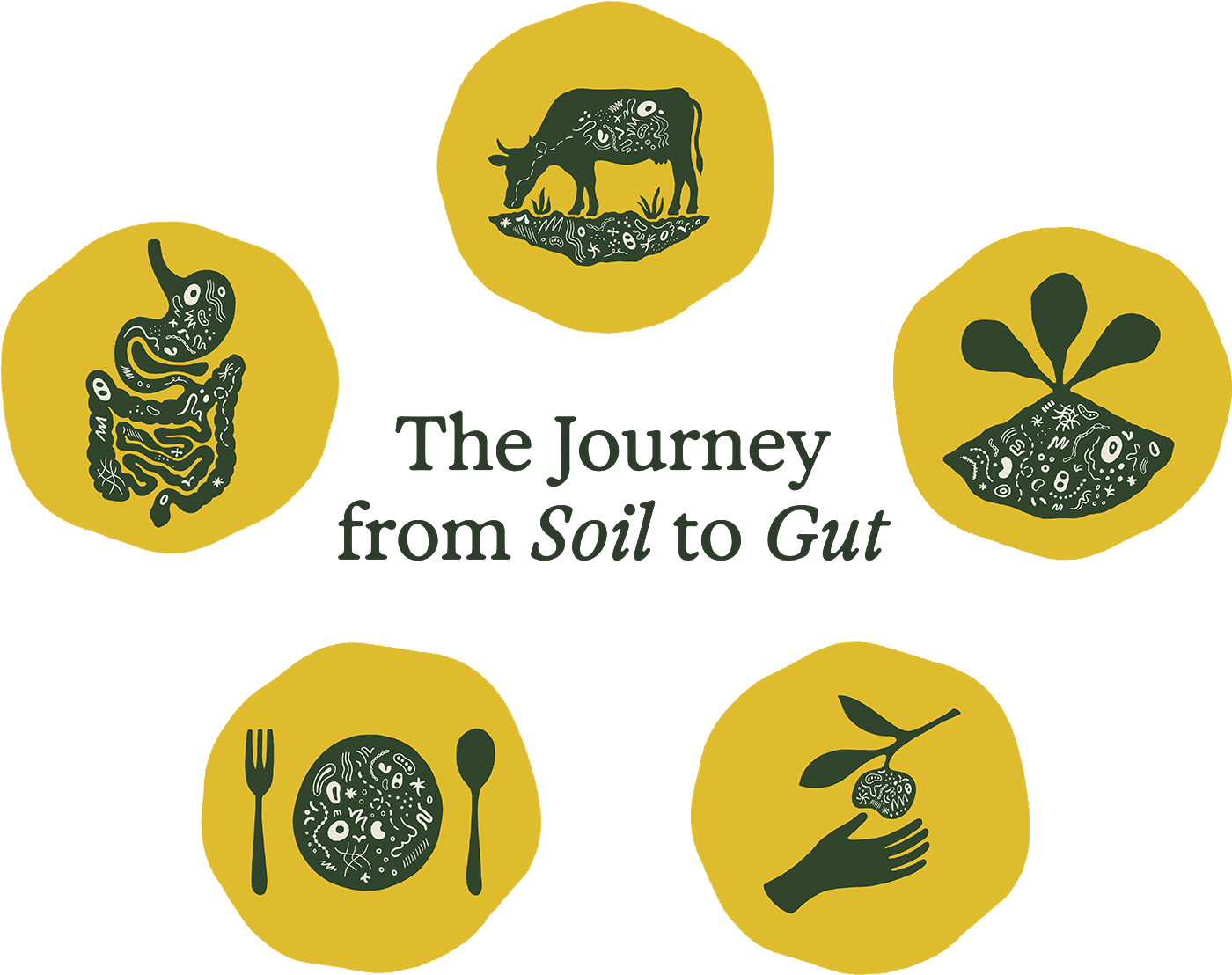
Health in Harmony
Exploring the Relationship Between Human and Planetary Health
The environment shapes our health in profound and often unnoticed ways, woven into the fabric of our daily lives. It influences what we drink, eat, and breathe, and even how we move through the world. At the heart of it all lies an undeniable truth: a thriving environment is fundamental to the well-being of every person.
Read More
We readily acknowledge the impact of environmental air quality on our bodies, recognizing the dangers of inhaling polluted air. Yet, how often do we consider that the pollution of our soils can have equally dire consequences? When soil becomes depleted of vital nutrients, the quality of the food we consume suffers as well. Many of our meals carry the burden of chemical residues, a silent testament to the industrial practices that have become the norm.
When the environment
is sick – so are we.
This channel will delve into the intricate relationship between planetary health and human health, illuminating how our agricultural practices shape our collective well-being. The shift from small-scale farming to industrialized agriculture has led to an alarming increase in chemical use, with over 8 billion pounds of toxic pesticides sprayed globally for agricultural use each year (citation). This pervasive practice not only strips our planet of its topsoils, leading to diminished nutrient density in the seeds and foods we consume, but it also correlates with a troubling rise in human diseases. We see increases in cancer, autoimmune disorders, and reproductive and neurological issues—all directly linked to our daily exposure to agricultural chemicals through the food we eat, the water we drink and even the rain that falls from the sky. (citation)
By fostering awareness and understanding, we can pave the way for a future where the health of our communities and the health of our planet flourish together. We’re cultivating a new narrative, one where regenerative practices restore both our soils and our bodies.
Grounding in
Terminology









What is the Soil Microbiome?
The soil microbiome is the diverse community of microorganisms that live in healthy soils, including bacteria, fungi, archaea, and viruses. A teaspoon of soil contains more microbes than there are people on the planet (citation).
A healthy soil microbiome supports:
• Nutrient cycling
• Water retention
• Root formation
• Disease suppression
• Carbon sequestration
• Environmental resilience
What is Nutrient Density?
Nutrient density refers to the amount of beneficial nutrients—like vitamins, minerals, and antioxidants—found in a food relative to its calorie content. Foods that are ‘nutrient-dense’ provide more nutrients for fewer calories, making them healthier choices. For example, a gram cracker and an organic carrot might be the same weight and calorie content, but the carrot is more nutrient-dense due to the higher content of vitamins and minerals.
The same foods can have different nutrient densities based on how they were grown. A study revealed that organically grown wheat, corn, potatoes, apples, and pears averaged 60–125% more iron, zinc, calcium, phosphorus, magnesium, and potassium relative to conventionally grown counterparts (citation)
Eating nutrient-dense foods supports overall health, helps prevent disease, and promotes healthy growth and development.
What are heritage seeds / foods?
Heritage seeds are traditional seeds that have been passed down through generations and adapted to local environments. These seeds are open-pollinated, meaning they can reproduce naturally and maintain their characteristics over time. Foods grown from heritage seeds, like heirloom tomatoes or ancient grains, have a higher nutritional value and unique flavors (citation).
Not only do heritage seeds have a higher brix value, but they also encourage food resilience and enable communities to shape their own food systems through seed saving.
How does the soil microbiome affect nutrient density?
The soil microbiome improves the nutrient density of food by helping plants absorb essential nutrients like nitrogen, phosphorus, and minerals. Healthy microbes break down organic matter, making these nutrients more available to plants, which leads to more nutrient-rich vegetables and fruits. (Citation)
Soil has a considerable effect on human health, whether those effects are positive or negative, direct or indirect. As an important source of nutrients in our food supply, society must value the role soil plays in creating human health. (Citation)
What are GMO & Non–GMO
seeds / foods?
GMO (Genetically Modified Organism) seeds are created through genetic engineering to give plants specific traits such as pest or pesticide resistance (citation). Non-GMO seeds are seeds in their natural form that are developed through traditional breeding methods, maintaining their natural genetic make-up.
What is a Brix Test?
Brix tests help farmers and consumers assess the quality and nutritional value of produce. They are a measurement of the sugar content, vitamins, minerals, proteins and other solid content in the sap of a plant. A higher brix value can suggest a higher nutrient density and usually indicates more flavor. Nutrient-dense plants produce more complex sugars, making them more resilient to pests, frost and disease. This also means they don’t need to be treated with as many pesticides i.e. chemicals. (Ideally, they shouldn’t need any chemical interference at all). Plants with high brix readings help to regenerate the soil by increasing the percentage of organic matter and accelerating carbon storage. (Citation)
What is the gut microbiome?
The gut microbiome refers to the complex community of trillions of microorganisms residing in the digestive tract, including bacteria, viruses, fungi, and archaea. These are collectively referred to as gut microbiota, and the system they reside within is the gut microbiome. These microorganisms play a crucial role in regulating our metabolism, aiding digestion and nutrient absorption. They also influence our mood and energy levels – highlighting the importance of eating patterns for physical and emotional wellness.
A healthy gut microbiome supports:
• Enhanced immune function, as over 70% of the immune system is located in the gut (citation).
• Neurotransmitter production: The gut microbiome is responsible for producing 95% of serotonin, commonly known as the “happiness neurotransmitter.” (citation).
• Helps protect against pathogens (citation).
• Reduced transfer of harmful toxins into the bloodstream (citation).
• Lower systemic inflammation (citation).
• Increased nutrient availability and absorption (citation).
• Better metabolic health
An imbalanced gut microbiome is known as Dysbiosis and can lead to various health issues:
• Digestive problems
• Autoimmune disorders
• Chronic inflammation
• Mental health challenges
What is Metabolism?
Metabolism is the complex set of chemical reactions that occur within living organisms to maintain life. These processes convert the food we eat into energy, which the body uses to perform various functions, including growth, repair, and maintenance of cells.
What is Glyphosate?
Glyphosate is a widely used broad-spectrum herbicide designed to eliminate weeds, particularly those that compete with crops. As the active ingredient in numerous herbicides, including Roundup, it stands as the most commonly used agricultural chemical in the world.
A “2020 Review found that more than half the specific making up the core human gut microbiome may be susceptible to disruption by Glyphosate” (citation)

The soil microbiome and the gut microbiome exist in a cycle connecting our bodies to the earth beneath our feet.
From soil, to seed, to food, to gut, to earth again, this continuous loop illustrates how soil health and human health inform one another. The widespread decline of soil health, driven by factors such as pesticide use and industrial farming techniques, mirrors the decline of the human gut microbiome, leading to an increase in chronic diseases and weakened immunity in humans. Just as the overuse of agricultural chemicals disrupts the balance of microorganisms in the soil, so do environmental toxins and highly processed foods affect the delicate ecosystem within our digestive system.
The practices of Regenerative agriculture offer a pathway to restore this balance. By prioritizing soil health through methods like rotational grazing, cover cropping and reducing chemical inputs, these practices nurture a thriving soil microbiome. In turn, healthier soil produces more nutrient-dense food, which supports a more diverse and resilient gut microbiome. Improving soil health is a powerful step toward improving human health, as what we cultivate in the earth ultimately nourishes our bodies, fostering resilience against modern diseases.
Nurtured
by Nature
About Series
“Let food be thy medicine and medicine be thy food” highlights the truth that what we eat profoundly influences our state of well-being. Our ancestors understood that food was not merely a source of sustenance; it held the profound ability to heal and nourish. This ancient wisdom is still alive in our communities today, serving as a reminder of the incredible potential that food possesses to restore balance in a body beset by dis-ease
In this series we are encouraged to venture beyond conventional medications and embrace the profound healing potential of natural foods and plants. These personal, human-centric stories of healing highlight a growing recognition of our deep connection to the natural world, revealing its remarkable capacity to restore balance in our lives. These stories serve as a testament to the power of nature in nurturing our well-being and remind us of the wisdom inherent in the earth’s bounty.
Glyphosate
About Series
This series aims to educate on the pervasive presence of glyphosate in our food systems and provide solutions so that we can forge an oath towards the regenerative practices that prioritize the health of our soil, our bodies and the ecosystems we share.
Nutrient
Density
About Series
And yet, not all foods are created equal. How they’re grown directly impacts the nutrient-density of each bite.. A compelling study found that organically grown wheat, corn, potatoes, apples, and pears contained up to 125% more essential minerals—like iron, zinc, calcium, magnesium, and potassium—than their conventionally grown counterparts. It’s a reflection of how nurturing the earth nurtures us in return.
In this series, we’ll uncover the profound ways nutrient-dense foods support our health, protect us from disease, and foster growth. But it doesn’t stop there. These same foods hold the power to restore our soils, reconnecting us to the cycles of life that sustain us all.
The Science
of Wellness
About Series
Every disease starts in the gut, where our microbiome acts as the foundation for both immune and metabolic health. Over 70% of the immune system resides in the gut, making it the body’s first line of defense. The gut, when neglected, quietly influences every aspect of our well-being.
By nourishing our gut with diverse, whole foods and embracing regenerative agricultural practices, we can encourage healing from the inside out and reconnect to the earth, cultivating true, lasting health.
In this series, we’ll invite you to join us as we explore stories that weave together science and health. These discoveries will not only inform but inspire, illuminating vibrant pathways to a healthier and more fulfilling life. This series uncovers the narratives that shape our understanding of what it means to thrive.
Unprocess
Your Life
About Series
Soon we will navigate this intricate landscape, empowering you to reclaim your health and make informed decisions about the nourishment you provide for your body.
“
It’s such a collaborative place, inside and outside of us
”
– Bikle and Montogomery in The Hidden Half of Nature
